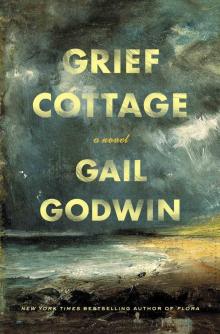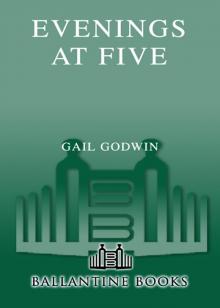- Home
- Gail Godwin
Unfinished Desires Page 11
Unfinished Desires Read online
Page 11
“May I ask what you did to get yourself banished from Mount St. Gabriel’s?”
“I said something really rude to Mother Ravenel. It was on vocation day—every year we celebrate the birthday of our foundress, Mother Elizabeth Wallingford; there’s a program put on by the whole school. It’s the day girls in the academy are invited to ask God if they might have a vocation. And if they do, they march up to the stage and declare themselves, and then right after the program they meet with Mother Ravenel in her office.”
“What you said must have been very seriously rude.”
“It just sprang out, like a toad that had been crouched inside my mouth for years. It was something only someone in our family was entitled to say to her, but it was also the one thing that should have been left unsaid by anyone under her control. It hurt her, as it should have, and made her absolutely furious.”
Mother Malloy was listening in profile now, head lowered, pale hands folded upon her lap.
“I said it out of nervousness, to protect myself. We were in her office by then. She had summoned me after the program. No girl that year had marched up to the stage to declare a budding vocation, and she was put out and, I suppose, ready to blame it on me. She was giving me a real dressing-down, saying it was time we got to the bottom of my puerile behavior.
“What I had done was, well, what I did every vocation day since I was ten: gotten my usual fit of giggles and had to excuse myself from the auditorium. There always came a point during the program when I lost control. I never knew what was going to set it off, but something always did. This time it was a girl reciting a poem she had written for the occasion, a bunch of cloying little couplets with predictable rhymes. The poem was supposed to be about the night before our foundress is to take her first vows, and she goes out in the moonlight on her family’s Oxfordshire estate—she’s in her nightgown—to say goodbye to her—oh, dear, here I go—to say farewell to her—oh, ha, ha!—‘pulchritudinous hair’—!” Madeline shot up from the bench and paced back and forth until she got her convulsions under control.
She was just about to conclude repentantly, “See? That’s how I disgraced myself every vocation day,” when she saw that Mother Malloy, hands still folded upon her lap, was also shaking with laughter.
“Oh, please, Mother, you have to say what you find funny.”
“I will, I promise. But do go on. I am enjoying the way you tell it.”
“Well, first of all, our foundress was twenty-nine when she took vows; she was a certifiable old maid who had been saving herself up for God. She and her friend Fiona Finney had been working on this scheme together, and Elizabeth had just converted to Catholicism—she’d gone through instruction and all of that. The last thing in the world she would have been thinking about was her hair. Who knows or cares if she even had pulchritudinous hair?”
Laughter brought agreeable color to Mother Malloy’s face. “Go on.”
“Well, as I say, I lost control and Mother Ravenel shot me a withering look and I slunk out of the auditorium. Of course, by then these outbursts of mine had achieved their own notoriety—my exits had become part of the yearly show. What made it different this time was that no girls had marched up to declare vocations to keep Mother Ravenel busy afterward. So there I was, in her office, and she pulled out this little black spiral notebook from a drawer and found the page she wanted and said: ‘Now, Madeline, you have been finding vocation day sidesplitting since you were a child in fifth grade. You see, I have kept a record. And now you are a freshman in the academy, a young woman. Why are you still behaving like a ten-year-old?’”
Madeline, a good actress, spoke the headmistress’s lines in a fast-paced drawl very like Mother Ravenel’s.
“Then she closed the book, but kept a finger in it to mark her place. She looked up at me from under her eyebrows the way she does when she’s about to skewer you, and she said, ‘You know, Madeline, the psychologists tell us that helpless laughter often masks fear. If this is true in your case, don’t you think it’s time we get to the root of why the vocation day program makes you fearful?’
“And I was also wondering what else about me was on those pages. She was always saying to us that she was going to write down this or that about us in her ‘little black book,’ but I always thought she meant it as a figure of speech. That the book actually existed was pretty scary.
“She went on probing me. Did I have any idea what this root cause might be? I said that something just came over me and I couldn’t control it.
“She asked what that ‘something’ might be, and I said I really didn’t know, and that’s when she asked would I like to hear her idea about it.
“What could I say but ‘Yes, Mother,’ and that’s when she skewered me. ‘I think it is God calling you, Madeline, and you’re scared, as any sensible young woman should be.’
“Then the Rav—Mother Ravenel started quoting from ‘The Hound of Heaven,’ that whole first stanza all the academy girls have to memorize for Moral Guidance—about fleeing Him down the labyrinthine ways and in the mist of tears. By the time she got to hiding from Him ‘under running laughter,’ I knew exactly where she was going.
“But the toad was already perched on my tongue, ready to spring. I let her finish the stanza—’All things betray thee, who betrayest Me’—and give me that self-congratulatory, victorious look, and then I said, ‘Whatever it is that might be calling me through my laughter, Mother, I hope I will have the restraint not to jump the gun on my vocation and ruin someone else’s life.’”
Madeline paused for effect. “I guess I’d better stop here and explain that my aunt Antonia was the one whose life got ruined. She and Mother Ravenel, who was then her best friend, Suzanne, had pledged to take their first vows together at the end of their senior year. My Tilden grandparents were planning this huge party for both of them—Suzanne’s family had disowned her, you see, and wouldn’t even come up with the dowry; the Order ended up paying for her—and then Suzanne jumps the gun and enters at spring break, without telling anyone. It broke Aunt Tony’s heart. Aunt Tony was my mother’s twin.”
“Yes, I knew that. But then your aunt married Mr. Vick—”
“That was later. That was a whole other story. Though my mother sometimes says it was the same story played out to its ill-fated end.”
“But there must have been more to it than that,” said Mother Malloy. “Your having to leave Mount St. Gabriel’s.”
“Oh, it ended up being a mutual agreement between the Ravenel and me,” said Madeline, not bothering this time to censure the family’s pet sobriquet for the headmistress. “I was given a chance to apologize, and did so right there on the spot. I admitted I had been rude and disrespectful. I also knew I had hurt her and that I didn’t regret it, but I did not admit that. Then she said we both needed to pray about what had taken place between us, and I was to come back a week later for another talk. Meanwhile, she said, we should keep this ‘just between ourselves.’ She likes to isolate people that way—keep all the secrets just between them and herself. But of course I went right home and told Mother and Daddy, and they both agreed I had gone too far to ever get back in her good graces. Daddy, who can’t stand for anyone to find fault with his daughters, was all for my transferring to Mountain City High the very next day; he was even working out how he could buy me a car, though I was all of fourteen and couldn’t have driven it. But Mama said it would look bad on my record if I didn’t finish out my freshman year at Mount St. Gabriel’s. She advised me to eat humble pie and let Mother Ravenel think she had awakened something in my heart, but say that I ‘needed time to grow into it.’ So I went back the following week and was modest and repentant and agreed with Mother Ravenel that I had lashed out at her because maybe I was afraid of the Big Somebody Who might be following me. The upshot was that before we parted we were hugging and she had made a huge concession—for her. I was allowed to finish out the year with my best efforts and she would just leave the part blank where a
girl is invited, or not invited, back the following year and sign her name below. She said, ‘I am going to take a chance on you. You know, St. Ignatius of Loyola said, Give me a child until he is seven and after that he is ours. Well, we will have had you for nine years, Madeline, and I believe wherever you go you will always be a lady and you will always belong to God.’”
“That is quite a story, Madeline,” said Mother Malloy, after a thoughtful interim. “You’ll understand why it wouldn’t be appropriate for me to make any comment beyond that.”
“Oh, sure, of course,” agreed the girl, resuming her place on the bench beside the nun. “But you did promise to tell why you laughed.”
“You said it yourself. It’s such romantic nonsense. The night before her vows, Elizabeth Wallingford was surely caught up with all the challenges of founding her order. And she and Fiona Finney were already making plans to go to America. And here we are, as a result of their dreams.” She pulled a watch from a deep pocket. “And I’m due back for my next class. Thank you, dear Madeline, you have revived me. Please tell your mother I’m eager to meet with her as soon as she can find time. And I want you to know I haven’t forgotten what I promised you that first day: I’m doing my best to watch over Tildy’s intrepid soul.”
“I’ll walk part of the way back with you, Mother.” But not far enough to pass a Ravenel-manned window. “Now I’m feeling guilty that I talked the whole time about myself.”
“But I asked you. Needless to say, what you’ve told me won’t go any further.”
“Oh, everybody knows all about it, Mother. It’s just one more story bubbling away in the school stewpot. More stuff gets added every year and everyone tosses in their favorite spices and keeps stirring away. It’s pretty thick, by now. And our family’s various contretemps figure prominently in the mixture, of course, though I’d say by this time Mother Ravenel’s contributions dominate the brew.”
“You and Tildy have such a command of language.”
“Wait till you meet Mama. She adds a tang all her own, a bit like Tabasco sauce served over dry ice. Uh-oh!”
Mother Ravenel, traveling at her usual velocity, had wheeled suddenly into view on the path. “Why, Madeline, how nice to see you!” she drawled, her aviator sunglasses concealing whatever else she might be feeling.
Once more, Madeline regurgitated her spiel about the half days at “Mountain City Low School,” which seemed to go down well with Mother Ravenel.
“And so you just came by for a little meditation in our grotto,” prompted the headmistress.
“Well, no, Mother. Actually, Mama asked me to drop by and tell Mother Malloy that she’ll meet with her next week to discuss Tildy’s grades.”
“Oh, is there some problem with Tildy I wasn’t informed of? Maybe you could stop by my office after chapel, Mother Malloy, and fill me in.”
“Certainly, Mother,” replied the younger nun, looking discomfited by the implied reprimand from her superior.
Now look what I’ve gone and done, thought Madeline, thoroughly peeved with herself. Why couldn’t I just have told a little white lie about needing a spot of meditation in the good old grotto? The Ravenel always does that. Makes you say more than you meant to, and then somebody always gets skewered.
CHAPTER 11
Sister Bridgets Chore List
Around noon, July 31, 2001
Feast of St. Ignatius of Loyola
Grounds of the St. Scholastica Retirement House
(formerly the Sanderson estate) Milton, Massachusetts
I AM BROUGHT particularly low today, Lord. I have no money of my own and my eyes are failing and I have no means of escape. Though I can follow the sunlight on the white gravel of this driveway back and forth between the house and the gates, and though I can still walk without a cane if I choose my steps with care, someone persecutes me with relish. You know who I’m talking about. She is younger and stronger and grinds down my soul. Her heart is a stony place. If she were one of my old girls, I would summon her to my office and have a very serious talk with her about the advantages of imitating compassion until she learns to feel it. And if she didn’t show improvement by the end of the year, out she’d go. But, and I am trying to appreciate the irony of this, Lord, I am one of her old girls now, and I can’t go anywhere. What am I going to do?
This sun is hot, Suzanne. Let’s go into the summerhouse. Be careful of the rickety steps.
I’ll sit here, where I can’t be watched from the house. She watches everything. Lord, please do something.
What would you have me do?
I won’t ask You to smite her; we’re not back in Old Testament times. I wouldn’t even ask You to afflict her with some illness, because I do feel compassion. Sister Bridget is one of Your sparrows and You know her exact feather count, just as You know mine.
What do you need in order to complete your soul’s tasks?
The girls will be heartbroken if I don’t get to finish Mount St. Gabriel’s Remembered. I’ve made such a good start.
Why shouldn’t you finish it?
You know why. But You want me to put it into words so I will see it for myself. My best time for dictating is the twilight hour before Compline. As You know, we have our ridiculously early supper so the cook can load the dishwasher and go home, and then I take a turn up and down the driveway and assemble my thoughts. By the time I go back to my room and press the Record button, the words pour out in fully formed sentences. But that’s because they’ve had all day to organize themselves. That is my method; that is how I have always worked best.
You’ve always saved the evenings for your reflective composing, yes.
And then she posts the midsummer-to-Advent chore list on the refrigerator. Midsummer to Advent. In Your sight, a thousand years are the same as one evening, according to the Psalmist. But, given the life expectancy of an eighty-five-year-old human, midsummer to Advent is equivalent to roughly a decade in the life of a young adult. And, under the vow of obedience, I must now squander this precious portion of what is left of my creative span by telephoning all the hospitals and assisted-living facilities in the Boston area for their Catholic deaths that day. I dictate the names to Mother Galyon—excuse me, “Sister Frances”—who still has her eyesight. She sits across from me in the stifling little telephone parlor and writes them out for Compline prayers that night. The next day, Sister Bridget, who is both superior and provincial of our deplorably shrunken Order, sits down in her air-conditioned office and pens personal notes to the next of kin: Just wanted you to know that our community of St. Scholastica prayed for your loved one, N, on the day of his/her death. It makes for good PR, she says, and of course the next of kin join our mailing list for end-of-year solicitations.
As You know, Lord, I went to Sister Bridget and asked whether Sister Frances couldn’t do the phoning as well as the writing part. “Sister Frances has offered it,” I said. “She’s right there in the room anyway; she can hear and see. It doesn’t need the two of us.” And You heard what my superior said: “Your voice has class, Sister Suzanne. People remember it.” I always warned my girls away from that word. It’s the quickest way in the world, I used to tell them, to let people know you don’t have any. I just wish I’d stopped myself from adding that Sister Frances knew how important this project was to me, and that I am always most fluent in the evening, after having had the day to organize my material. Because that gave Sister Bridget the perfect opportunity to say I had become obsessed with this “vanity project” backed by wealthy alumnae and with “glorifying my own creativity” at the expense of the community.
She’s all of sixty-five, and she disciplines sisters twenty years her senior as though she were their novice mistress. Always on the lookout for faults. Like when Sister Odelie—I must say it’s hard for me to think of our math-whiz Mother Odom as “Odelie”—was preparing our meals on the cook’s Thursdays off and Sister Bridget made her stop in the middle of whisking a hollandaise because she was “puffed up with pride.�
� I hope I was never guilty of misusing my power like that—back when I had some. Lord, I have been in Your service for sixty-seven years. But my heart is in this school memoir, which she calls a “vanity proj ect.” The question is, How can I honor my vow of obedience and follow my heart?
You always wake early, Suzanne.
Always have. Before the light, before the birds.
What then?
Well, first, as You know, I feel my way down the hall to the community bathroom. A full bladder can certainly dull the ardor of an elderly person’s morning prayers. Then, since my knees have gone stiff, I get back in bed and You and I have our first exchange of the day. My mind is rested and receptive and I think I hear You best then.
You’re hearing me now.
Yes, Lord.
We’re going to change your routine. Tomorrow morning, as soon as you come back from the community bathroom, go straight to your desk. Press Record on your machine and speak to whatever floats up about the school. Don’t stop to arrange topics or prettify sentences.
Even before I pray?
Look on it as a form of prayer. Your first offering, uncluttered, unedited.
But this “floating” method may pose a problem, Lord. What worries me is, How do I keep the thoughts meant for my soul’s repair … from infiltrating the published memoir?
You can’t.
But the whole project will be changed.
If you are changed already by this project, why shouldn’t your narrative have room for change, too? No more analysis for now, Suzanne. Tomorrow morning, after the community bathroom, sit down at your desk, press Record, and simply speak to your girls from the urgency of your heart. Let’s see where that takes you.
Holy Daring: A Predawn Digression
My dear girls, this morning I want us to consider together what our foundress meant by “holy daring.”
That Mother Wallingford (1863-1930) was a remarkable woman is evident from what she accomplished in her lifetime and the legacy she has left to all of us who had the good fortune to pass through the portals of Mount St. Gabriel’s.

 The Making of a Writer
The Making of a Writer The Making of a Writer, Volume 2
The Making of a Writer, Volume 2 Old Lovegood Girls
Old Lovegood Girls Flora
Flora Publishing
Publishing The Finishing School
The Finishing School Grief Cottage
Grief Cottage Evenings at Five
Evenings at Five Unfinished Desires
Unfinished Desires